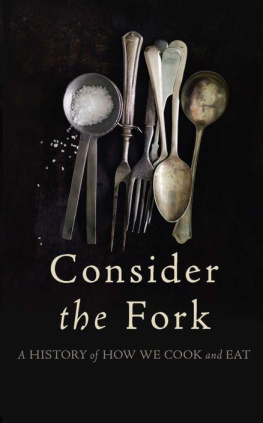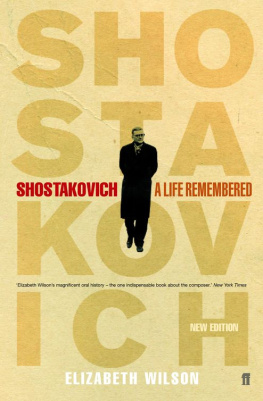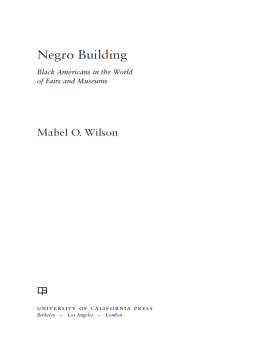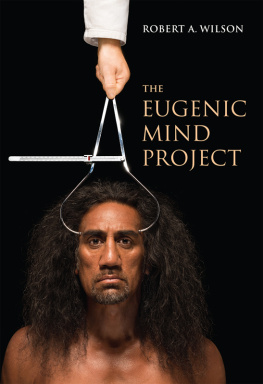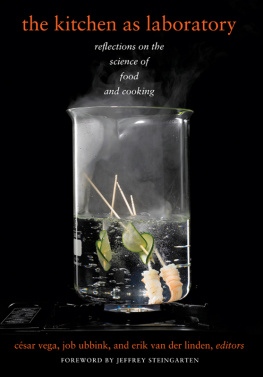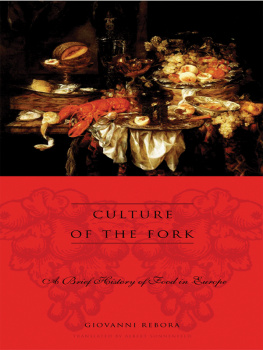Praise for Bee Wilsons Consider the Fork
Bee Wilsons supple, sometimes playful style in Consider the Fork... cleverly disguises her erudition in fields from archaeology and anthropology to food science.... Wilsons insouciant scholarship and companionable voice convince you she would be great fun to spend time with in the kitchen.... [She is a] congenial kitchen oracle.Dawn Drzal, New York Times Book Review
Wilson... writes beautifully and has the academic chops to deliver what she promises.... Reading the book is like having a long dinner table discussion with a fascinating friend. At one moment, shes reflecting on the development of cast-iron cookware, then shes relating the history of the Le Creuset company and the publics changing tastes in color and then shes reminiscing about her mother-in-laws favorite blue pots.Los Angeles Times
Wilson remains engaging, and nowhere as deeply or as smoothly as in Consider the Fork, where the information she has to juggle is at once gastronomic, cultural, economic, and scientific.... Everything in Bee Wilsons pithy book brings you back to the kitchen: her histories of weights and measures and pots and pans; her observations on the domestication of fire and ice;... her homey riffs on small, exasperating technologies like egg timers, cake molds, tongs, and toasters.The New Yorker
Substantial and entertaining.... Wilson belongs to a rare breed: the academic who can write. This book is dense with research, all of it rendered highly palatable.... The history comes in delicious nuggets of the kind that one immediately wants to pass around in conversation.Mail on Sunday (London)
The path from Stone Age flints to sous-vide machines whirs so smoothly that I found myself re-reading passages just to trace how the author managed to work in a Victorian copper batterie de cuisine along the way.The Washington Post
Each chapter is a discursive journey from past to present, across continents and cultures, opening our eyes to the wealth of material in our own kitchens.... [A] wide-ranging book, where... scholarship is always worn lightly.... Wilson is therefore equally at ease writing about recipes or economics, manners or morals.New York Review of Books
A delightful compendium of the tools, techniques and cultures of cooking and eating. Be it a tong or a chopstick, a runcible spoon or a cleaver, Bee Wilson approaches it with loving curiosity and thoroughness.... But as well as providing wry insights into the psychology of cooks down the ages, Consider the Fork is infused with a sense that every omelet, cup of coffee, meringue or tea cake is steeped in tradition and ancient knowledge, and that that is partly what makes cooking one of lifes joys.Spectator (London)
[A] wide-ranging historical road map of the influence of culture on cuisine.... It is easy and delightful to get swept up in Wilsons zeal. And the rejection of a traditional narrative arc does not indicate a lack of structure; rather, the books horizontal shape is a choice that suits its material.... Cooking is full of paradoxes. It is art and science, ancient and modern, fundamental and trivial, easy and difficult. Wilson presents these dissonances in their entirety, making no show of resolving them. In the end, her tone suggests that she writes about food for the same reason we read about it: sheer pleasure and lighthearted fascination. The big questions are just seasoning for the soup.New Republic Online
Wilson celebrates the unsung implements that have helped shape our diets through the centuries. After devouring this delightful mix of culinary science and history, youll never take a whisk for granted again.Parade
Wilson... skillfully turns a potentially dull subject into one of wit and wisdom. Nor does she lose touch with the human element that has drawn so many into the world of cooking and the universal subject of food. After all, a knife is only as good as the cook who wields it. Wilson packs Consider the Fork with as many bits of cultural history trivia as an overstuffed utensil drawer.Christian Science Monitor
What new intellectual vistas remain to be conquered by the food obsessive?... The erudite and witty food writer Bee Wilson has spotted a gap in the market.... [Her] argument is clear and persuasive.Guardian (London)
Endlessly fascinating.New Statesman (London)
A book to keep at your side as you cook.... Wilson serves up brisk histories of everything you use in the kitchen.The Daily Beast
You know that corner cupboard full of kitchen gadgets that promised to transform our lives?... In that corner cupboard lies a rich history of technological promise and dashed hopes. One that, until Bee Wilsons recent release, Consider the Fork, nobody has thought to tell.... Clearly-written and methodically researched, Consider the Fork fills a real void in culinary literature.Toronto Star
Wilsons tour of the kitchen explores all the essential elements of domestic cookery through the ages.... Wilsons book is diligently researched and she has a sharp eye for a vivid historical detail.Daily Mail (London)
Like all the best books on apparently simple everyday commodities, this is of course really a gripping story of millennia of human ingenuity.... Consider the Fork wears its impressive research lightly.Observer (London)
Wilson shifts the focus from the foods people ate to the technology behind their preparation, tracing how humble kitchen implements such as forks, whisks, pots, and stoves shaped our diets, our societies, and our bodies. In Wilsons hands, even hot water becomes interesting.Discover Magazine
Open[s] windows on the dynamic interplay of science, technology and the culinary arts in history.... Consider the Fork delves into the chewy past of kitchen technology.Nature
Focusing on culinary tools, the author hopscotches through human history around the globe, recording both strides and stumbles.Washington Times
Wilsons spirited history of kitchen implements ranges from the humble wooden spoon to the cutting-edge sous vide machine. A British food writer and historian, Wilson is learned and personal, wise and charming.... There are complex investigations at work in Wilsons book; its nominally about things in our cabinets and on our shelves, but its really about family, labor, technology, sensation.... From such ingredients an enchanting book is made.Smithsonian Magazine
One of the delights of Consider the Fork is that [Wilsons] fascination with the history of food is balanced by the pleasure she takes in preparing dishes herself, watching others do so and, best of all, tasting the results. Ms. Wilsons design critiques of different utensils, from the humble wooden spoon to a snazzy sous-vide water bath, are all the more convincing for being made by a knowledgeable and passionate cook, who isnt afraid to admit to her failures, yet longs for delicious successes.Alice Rawsthorn, NewYorkTimes.com
Some of humanitys least sung but most vital gadgets are celebrated in this delicious history of cooking technology.... Wilson is erudite and whip-smart, but she always grounds her exploration of technological change in the perspective of the eternal harried cookshes been onestruggling to put a meal on the table.
Next page
